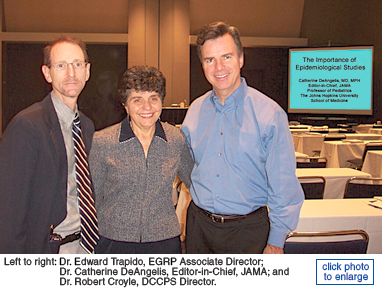First NCI Epidemiology Leadership Workshop: Tobacco, Diet, and Genes
September 19-21, 2004, Chicago, Illinois

The National Cancer Institute's (NCI) extramural research program in epidemiology, the Epidemiology and Genetics Research Program (EGRP), recently held its first annual leadership workshop with investigators focusing on tobacco, diet/energy balance, and genetic research. EGRP is part of the Division of Cancer Control and Population Sciences (DCCPS) and manages a portfolio of 500 cancer epidemiology research grants totaling $200 million per year.
Seasoned principal investigators funded through EGRP were asked to this by-invitation-only-meeting held in Chicago, September 19-21, 2004. "We are especially excited to have funded leaders in the field of epidemiology, tobacco, and diet/energy balance sharing their time to identify future research directions. We believe this will help lay the groundwork for future NCI initiated and supported research," said Dr. Edward Trapido, EGRP Associate Director. More than 100 grantees, intramural epidemiologists with the Division of Cancer Epidemiology and Genomics (DCEG), and EGRP scientific staff attended. View meeting agenda.
The 1st NCI Epidemiology Leadership Workshop was held to identify barriers and gaps in cancer epidemiology and to advance solutions to study of tobacco diet/energy balance, and genes. It also brought together grantees to highlight state-of-the-science findings in these areas, provide opportunities to explore new collaborations, and to showcase the scientific accomplishments of the EGRP-supported research portfolio.
Integrate Epidemiology Into Initiatives
"The meeting comes at a time when biomedical research is faced with many issues and initiatives that cut across scientific disciplines," said Dr. Robert Croyle, DCCPS Director. "Genomics and proteomics research alone cannot answer epidemiologic questions. We need to know how to integrate epidemiology in these new initiatives, and we need epidemiologists to become more involved in planning them."
Keynote speaker Dr. Catherine DeAngelis, Editor-in-Chief of the Journal of the American Medical Association, talked about the importance of epidemiologic studies to public health. In another keynote address, Dr. Susan Curry, presented on the relevance to epidemiology of the report Fulfilling the Potential for Cancer Prevention and Early Detection, by the Institute of Medicine's National Cancer Policy Board. She is lead editor of the report and is Director, Institute for Health Research and Policy, University of Illinois at Chicago.
Presentations by workshop participants included Dr. Laurence Kolonel, Cancer Research Center, University of Hawaii, on diet, genes, and cancer; Dr. Neil Caporaso, DCEG, on tobacco, genes, and cancer; Dr. Stephen Chanock, DCEG and the Center for Cancer Research (CCR), on genetics in epidemiology; Dr. Michael Thun, American Cancer Society, on cohort consortia; and Dr. Patricia Hartge, DCEG, on case-control consortia. Also speaking were Dr. Graham Colditz, Brigham and Women's Hospital, Harvard University, on the potential conflict between team science and tenure requirements; and Dr. Jon Kerner, DCCPS, on knowledge transfer of epidemiology.
Follow-up Working Groups
Research working groups will be formed based on the breakout sessions which focused on diet/energy balance epidemiology research, haplotyptes versus genotypes, epidemiology of rare cancers, and susceptibility to tobacco carcinogenesis. Extramural and intramural scientists will collaborate in the groups to generate new scientific ideas and hypotheses.
Other small working groups will be established to assist in developing research initiatives within and outside NCI. EGRP's Drs. Virginia (Ginny) Hartmuller, Sandra Melnick, and Deborah Winn will play lead roles in the organization and stewardship of these teams.
To further translation of research findings, EGRP will assess whether the information presented at the workshop has potential for development of intervention studies. During the workshop, participants were encouraged at the workshop to think about scientific issues and questions that will move results from epidemiology studies into public health practice.
Increased Collaboration
Increased collaborations between EGRP and the extramural research community is key as evidenced by the workshop, which was planned with the assistance of Dr. Margaret Spitz, The University of Texas M.D. Anderson Cancer Center. She and Dr. Colditz spend time working each month at EGRP under the Intergovernmental Personnel Act (IPA).



